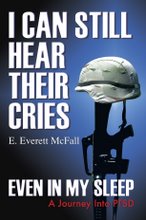By E. Everett McFall
By Grady Harp (Los Angeles, CA United States) - See all my reviews
An Amazon Top Ten Reviewer
A Corpsman's Response to The Vietnam War: Sequelae, October 13, 2007E. Everett McFall offers his own tragedies and illness and gradual recovery from the Post Traumatic Stress Disorder, the result of giving medical aid to the living and the dead during his tour of duty in Vietnam, 1966/1967. Responding to a therapist's advice to commit the unspeakable experiences to a written journal was the impetus to launch his slow and terrifying road to recovery, a journey that in his own words persists to this day.
The results of that initial journal are here in this collection of thoughts, reflections and poems he has appropriately titled I CAN STILL HEAR THEIR CRIES EVEN IN MY SLEEP: A Journey Into PTSD. It is a book that would be well for all of us to read and experience as, despite the horrendous accounts of war's disabling effects on the human mind, it is also one of the books that will be considered a retrospective first in the exploration of Post Traumatic Stress Disorder - a 'new' disease state dramatically brought to light by the experiences of Vietnam Vets.
McFall may not be trained as a poet, but he is more than sophisticated as a communicator. Few people who did not serve on a battlefield have an appreciation for the task assigned to Medics or Corpsmen, young lads whose expected life span in country was counted in days rather than in years. These are the 'field docs' who ministered to the wounded, salvaged those they could, and assisted the physicians in assimilating ‘matching’ body parts after mine and grenade and yet larger explosions threw disassembled arms, legs, torsos, feet, etc far from the point of 'enemy engagement', in order to ship the remains to the soldiers' families back home. How any Corpsman could escape psychic damage from such unrelenting trauma is impossible and McFall sensitively expresses the sights, the sounds, the odors, and the tragic aftermath of such an existence.
These poems are raw, difficult to read without a visceral response, but at the same time they demonstrate how at least one survivor, however injured by that experience, was able to revisit that time through poems and mark a path to gradual recovery. McFall generously adds to his book appendices such as 'Tips for Vets and Families Who are Managing Stress' and a 'Veterans Resource Guide and Directory', additions that make this sensitive book as much a gift to the war-experienced reader as it is a gift to the world of poetry. This is a book of courage, survival, and hope - and one well worth the attention of a wide audience.
Grady Harp, October 07







No comments:
Post a Comment